🇦🇺 Australia
🇨🇦 Canada
🇨🇿 Czechia
🇩🇰 Denmark🇪🇪 Estonia
🇮🇪 Ireland
🇮🇱 Israel
🇮🇹 Italy
🇯🇵 Japan
🇲🇽 Mexico
🇵🇱 Poland
🇰🇷 South Korea
🇨🇭 Switzerland
🇬🇧 United Kingdom
🇺🇸 United States of Americaand more
🇦🇺 Australia
🇨🇦 Canada
🇨🇿 Czechia
🇩🇰 Denmark🇪🇪 Estonia
🇮🇪 Ireland
🇮🇱 Israel
🇮🇹 Italy
🇯🇵 Japan
🇲🇽 Mexico
🇵🇱 Poland
🇰🇷 South Korea
🇨🇭 Switzerland
🇬🇧 United Kingdom
🇺🇸 United States of Americaand more
Calcemin Silver film-coated tablets bottle of 60 pcs.
$30.93
Calcemin Advance Complex is taken to stop or slow down bone loss at different stages of life. Thanks to its mineral-enriched formula, the complex can provide the body with additional calcium and promote the production of collagen for the bone matrix.
-
— or —
Pharmacological properties
Pharmacodynamics. Calcium is an important structural component of bone tissue. The use of calcium corrects the deficiency of calcium intake with food, especially with increased need or reduced absorption. Calcium carbonate is the salt with the highest content of elemental calcium. Calcium citrate increases the bioavailability of the drug in patients with reduced acidity of gastric contents, achlorhydria while taking h2-histamine receptor blockers; reduces the risk of urinary tract lithiasis with prolonged use, has a high antiresorptive potential due to inhibition of PTH.
Vitamin D is very important for the absorption of calcium, phosphates and magnesium in the small intestine. It regulates the content of these elements in body fluids and helps maintain normal calcium levels in the blood, and is also involved in the synthesis of organic elements and skeletal calcification.
Magnesium participates in bone metabolism, prevents bone demineralization, and inhibits calcium deposition in the walls of blood vessels, heart valves, muscles, and urinary tract.
Zinc is a cofactor for more than 200 enzymes and affects the process of bone remodeling.
Copper participates in the construction of the most important connective tissue proteins – collagen and elastin, which form the matrix of bone and cartilage tissue.
Manganese normalizes the synthesis of glycosaminoglycans, necessary for the formation of bone and cartilage tissue. It duplicates the calcium-sparing functions of vitamin D.
Boron regulates the activity of parathyroid hormone and through it the metabolism of calcium, magnesium, phosphorus and cholecalciferol.
Indication
Calcemin Advance. to reduce the rate of bone loss and correct calcium metabolism disorders, for the treatment of diseases of the musculoskeletal system and dental diseases. recommended for children aged 12 years and older, adults, including women in peri- and postmenopausal, especially in the presence of contraindications to the use of hormone replacement therapy. as part of the complex treatment of conditions accompanied by significant loss of bone mass. as a basic agent in the use of antiresorptives (hormone replacement therapy, calcitonin, bisphosphonates) and bone formation stimulants. osteopenic state, systemic osteoporosis and its complications.
Calcemin Silver. Comprehensive treatment of osteoporosis of various genesis: menopausal, senile, idiopathic, steroid, caused by prolonged immobilization, – and its complications (fractures, etc.), as well as severe dental and periodontal diseases. Recommended as a basic agent when using antiresorptives (hormone replacement therapy, calcitonin, bisphosphonates) and bone formation stimulants. To reduce the risk of fractures in cases of deficiency of calcium, vitamin D, minerals in the diet in people aged 50 and over.
Application
Adults and children over 12 years of age should take 1 tablet with meals 1-2 times a day. Wash down with sufficient water (200 ml). The maximum daily dose should not exceed 3 film-coated tablets.
The duration of treatment is determined by the doctor depending on the nature of the disease. If necessary, a repeated course of treatment is performed.
Contraindication
Increased individual sensitivity to any of the components of the drug (allergic reactions); hypercalcemia and / or conditions leading to hypercalcemia (sarcoidosis, malignant neoplasms and primary hyperthyroidism), severe hypercalciuria, impaired renal function, nephrolithiasis; hypervitaminosis D.
Side effects
Gastrointestinal: gastrointestinal and abdominal pain, dyspepsia (including abdominal discomfort), constipation, diarrhea, flatulence, nausea and vomiting.
Immune system disorders (allergic reactions, anaphylactic reactions, anaphylactic shock). Hypersensitivity reactions with associated laboratory and clinical manifestations, including asthma syndrome, mild to moderate reactions affecting the skin and/or respiratory system, gastrointestinal tract and/or cardiovascular system, have been reported rarely. Symptoms may include rash, urticaria, edema, flushing, itching, non-cardiogenic pulmonary edema. Severe reactions, including anaphylactic shock, have been reported very rarely.
From the laboratory parameters: with prolonged use in high doses, the development of hypercalcemia, hypercalciuria, hypervitaminosis D is possible.
Special instructions
Do not exceed the recommended dose. Calcemin Advance and Calcemin Silver should not be used simultaneously with other calcium or vitamin D preparations.
Overdose of calcium and vitamin D is accompanied by side effects, including hypercalcemia and hypercalciuria. Calcium and vitamin D should be used with caution so as not to exceed a total dose of 2500 mg of calcium and 4000 IU of vitamin D, taking into account food intake (see Conditions and shelf life).
Patients who are taking other medications containing vitamin D and/or calcium, or any other medications, should consult their doctor before starting this medication.
During long-term treatment with calcium-containing drugs in combination with vitamin D, as well as in patients with mild to moderate renal insufficiency (including elderly patients), it is necessary to monitor the level of calcium, phosphates and creatinine in the blood serum; calcium and phosphates in the urine. If signs of hypercalcemia appear or if renal function is impaired, calciuria exceeding 7.5 mmol / day (300 mg / day), the dose should be reduced or the drug should be discontinued. In patients with impaired renal function and with simultaneous use of cardiac glycosides, calcium channel blockers and / or thiazide diuretics, monitoring of the functional state of the kidneys should be carried out by determining the level of creatinine in the blood serum (see Interaction with other drugs).
Combination drugs should be used with caution in immobilized patients due to the increased risk of hypercalcemia. No dose adjustment is required for patients with impaired liver function. This drug should not be used in cases of impaired renal function, nephrolithiasis, or a predisposition to the formation of calcium deposits.
Use during pregnancy or breastfeeding. During pregnancy and breastfeeding, the drug is used according to indications and under the supervision of a doctor. During pregnancy and breastfeeding, the daily dose of Calcemin Advance should not exceed 2 film-coated tablets, Calcemin Silver – 1 film-coated tablet. The use of the drug in recommended doses is considered safe. The recommended doses should not be exceeded, since chronic overdose may be harmful to the fetus and newborn. During pregnancy and lactation, the total daily dose, taking into account food intake and drugs, should not exceed 2500 mg for calcium and 4000 IU for vitamin D.
Teratogenic effects have been observed in animals following overdose of vitamin D during pregnancy. There is no evidence to suggest a possible teratogenic effect in humans when vitamin D is administered at recommended doses.
Maternal hypercalcemia during pregnancy due to high doses of vitamin D has been associated with fetal hypercalcemia, which may lead to adverse effects in the newborn, including PTH suppression, hypocalcemia, tetany, seizures, and aortic stenosis syndrome, which may present with retinopathy, mental retardation, or growth retardation; and may also lead to neonatal hypercalcemia.
Vitamin D and calcium are excreted in breast milk. This should be taken into account if the child is receiving any preparations containing vitamin D and calcium.
There is currently no data to suggest a possible adverse effect of vitamin D and/or calcium on human fertility.
The ability to influence the reaction speed when driving vehicles or working with other mechanisms. Does not affect.
Children: Not intended for use in children under 12 years of age.
Interactions
When using this drug simultaneously with other medications, you should consult a doctor.
Interaction with other drugs
Calcium may reduce the absorption of other drugs by forming insoluble complexes in the gastrointestinal tract, including antibiotics (e.g. tetracycline, quinolones) and antiviral drugs, eltrombopag, sodium fluoride. Calcium absorption may also be reduced. To avoid potential interactions, these drugs should be administered at least 2 hours before or 4-6 hours after calcium administration, unless otherwise indicated.
Interaction with protease inhibitors. Concomitant use of calcium- or magnesium-containing drugs, including buffered drugs, leads to a decrease in the plasma concentration of all these compounds. Therefore, it is recommended to prescribe protease inhibitors 2 hours before or 1 hour after drugs containing aluminum, calcium or magnesium. Such effects have been observed with amprenavir, atazanavir and tipranavir.
Levothyroxine should be administered at least 4 hours before or 4 hours after calcium intake, as calcium reduces its absorption, possibly by forming insoluble complexes.
Phosphates, bisphosphonates, and fluorides. Calcium supplements reduce the absorption of bisphosphonates, so they should be taken at least 30 minutes before calcium, but preferably at a different time or day. Concomitant use with aluminum-containing antacids is not recommended due to reduced effectiveness.
Eltrombopag. A high-fat breakfast with calcium (427 mg) resulted in a 59% decrease in plasma eltrombopag levels, while a low-calcium meal (50 mg) had no effect on plasma eltrombopag levels. Calcium-rich meals and antacids containing aluminum, calcium, and magnesium significantly reduced systemic absorption.
Calcium and/or vitamin D. Diuretics reduce urinary calcium excretion. Due to the increased risk of hypercalcemia with concomitant use of thiazide diuretics, serum calcium levels should be monitored regularly.
When used simultaneously with furosemide and other loop diuretics, renal excretion of calcium increases.
Cardiac glycosides and calcium channel blockers. Hypercalcemia increases the risk of fatal arrhythmias with cardiac glycosides such as digoxin and reduces the effectiveness of calcium channel blockers such as verapamil in atrial fibrillation. Monitoring of serum calcium, ECG, and clinical status is recommended.
Glucocorticoids and hormonal contraceptives impair the absorption of calcium ions.
Vitamin D. Some medications may reduce the absorption of vitamin D in the gastrointestinal tract. To minimize interactions, these medications and vitamin D should be taken at least 2 hours before or 4-6 hours after taking vitamin D.
Such drugs include: ion exchange resins (e.g. cholestyramine), laxatives, orlistat. Carbamazepine, phenytoin or barbiturates increase the metabolism of vitamin D to its inactive metabolites and thus reduce its effect.
When Calcemin Advance / Calcemin Silver is used simultaneously with vitamin A, the toxicity of vitamin D3 is reduced .
Calcium Interactions with Foods and Supplements. Oxalic acid, found in spinach and rhubarb, and phytic acid, found in whole grains, can inhibit calcium absorption. Therefore, it is not recommended to consume calcium-containing foods within 2 hours of a meal rich in oxalic and phytic acid.
Iron, zinc, magnesium. Calcium supplements may reduce the absorption of iron, zinc, and copper from food. For individuals with adequate iron, zinc, or magnesium stores, this is of no clinical significance with long-term use. For individuals at risk of iron, zinc, or magnesium deficiency, it is recommended that calcium supplements be taken at bedtime rather than with meals to prevent inhibition of mineral absorption from food.
Fiber: Some components of dietary fiber may reduce calcium absorption. Taking psyllium with calcium does not appear to significantly reduce calcium absorption.
Overdose
When used in recommended doses, no cases of overdose were observed. Most reports of overdose are associated with the simultaneous administration of high doses of single-component or multivitamin preparations. In case of accidental overdose, symptomatic treatment is recommended: gastric lavage, drinking plenty of fluids, a diet low in calcium.
Long-term intake of calcium and vitamin D in doses exceeding 2500 mg of calcium and 4000 IU/day of vitamin D may lead to toxic effects.
In patients with hypercalcemia or conditions associated with hypercalcemia, renal failure and/or a predisposition to nephrolithiasis, toxic effects of calcium and vitamin D may occur when used in lower doses.
Acute or prolonged overdose of calcium and vitamin D can cause hypervitaminosis D, hypercalcemia, hypercalciuria, increased calcium absorption and hyperphosphatemia. The consequences are renal failure, “milk-alkali syndrome”, especially in patients with impaired renal function, vascular and soft tissue calcification, including calcinosis, leading to nephrocalcinosis and nephrolithiasis, especially in patients with a predisposition to nephrolithiasis.
Nonspecific initial symptoms, such as sudden onset of headache, muscle weakness, depression of consciousness and gastrointestinal disorders (abdominal pain, constipation, diarrhoea, nausea and vomiting), may indicate acute overdose.
If such symptoms occur, you should stop using the drug and consult a doctor.
Laboratory and clinical manifestations of poisoning and hypercalcemia may include the following symptoms: loss of appetite, weight loss, increased fatigue, thirst, polyuria, bone pain, cardiac arrhythmias, and impaired absorption of other minerals. Laboratory changes may include increased ALT and AST in plasma. Chronic overdose may cause calcification of blood vessels and organs due to hypercalcemia. Extremely high hypercalcemia may lead to coma and death.
Storage conditions
Calcemin Advance. No special storage conditions are required. Store in a tightly closed bottle.
Calcemin Silver. Store at a temperature not exceeding 25 °C in a tightly closed bottle.
You may also like


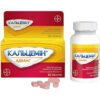
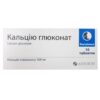
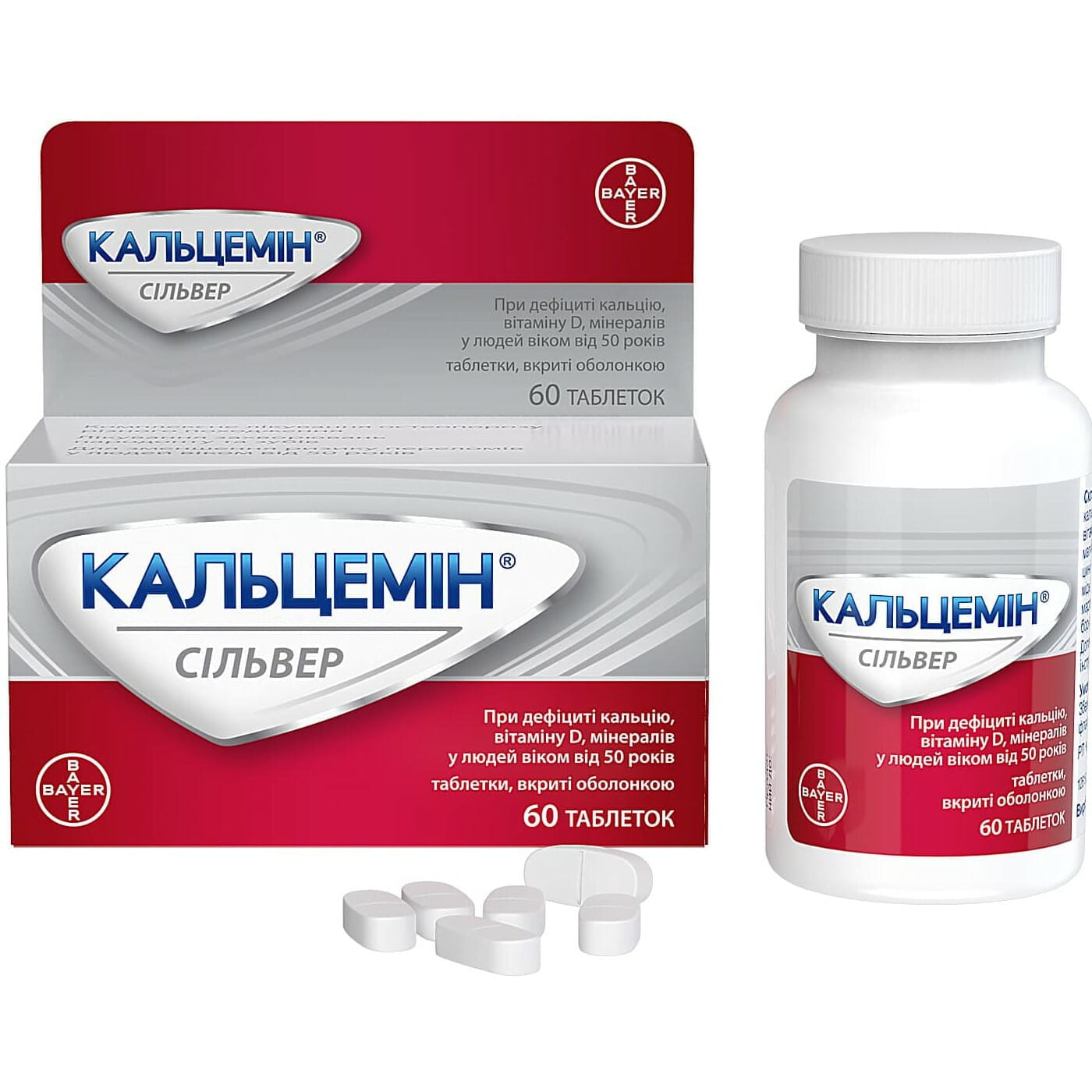
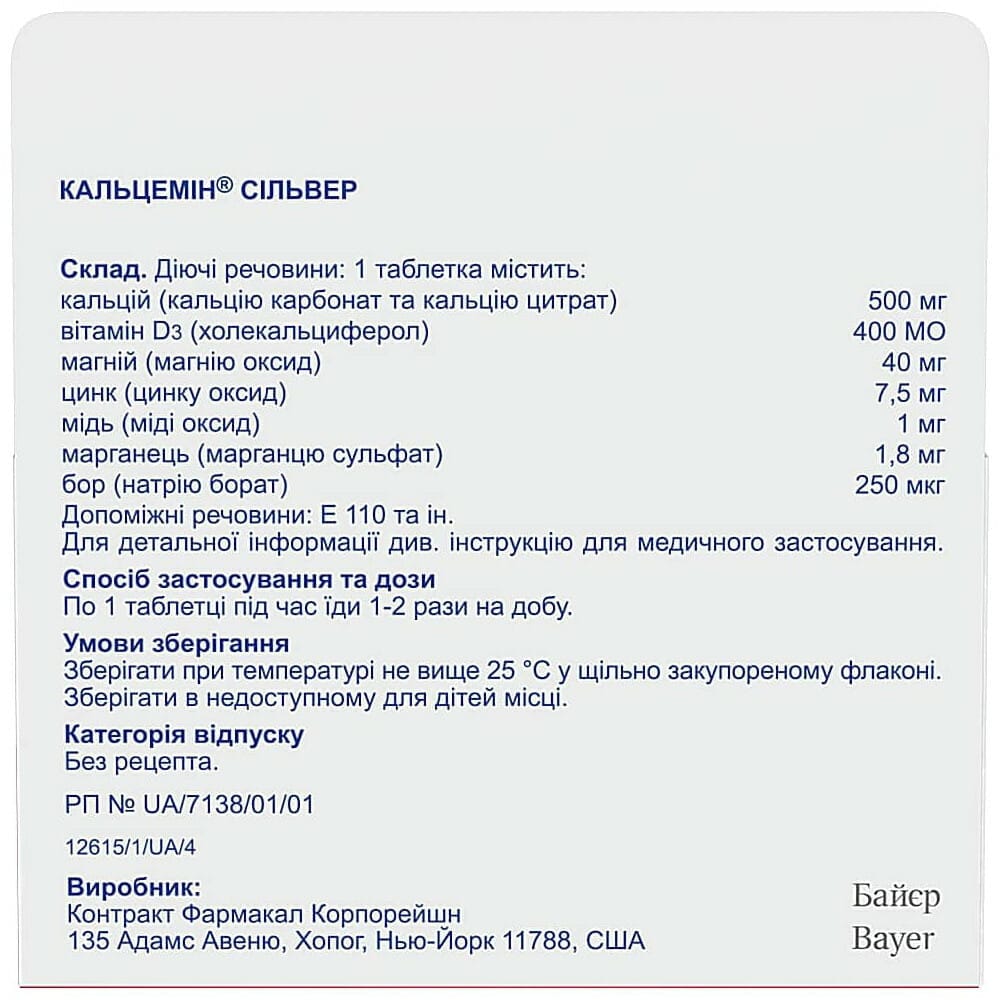
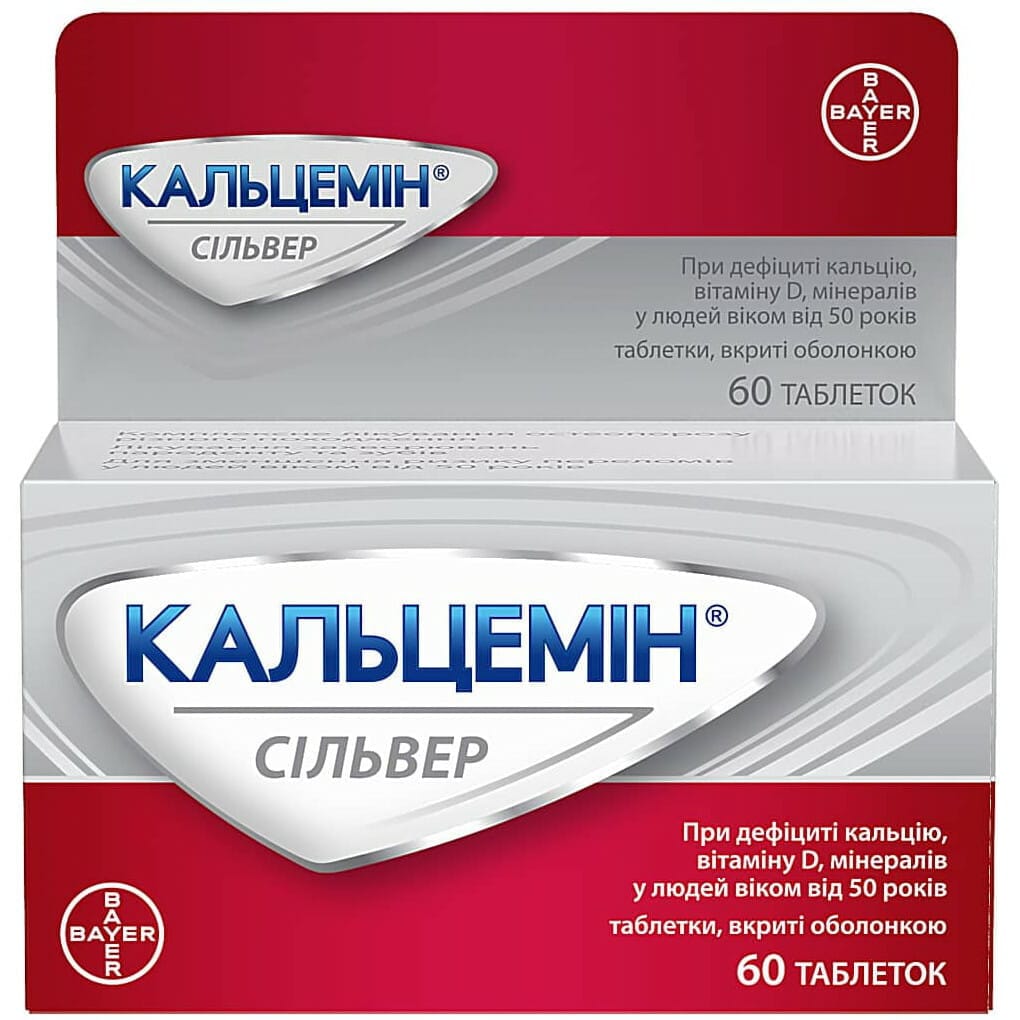
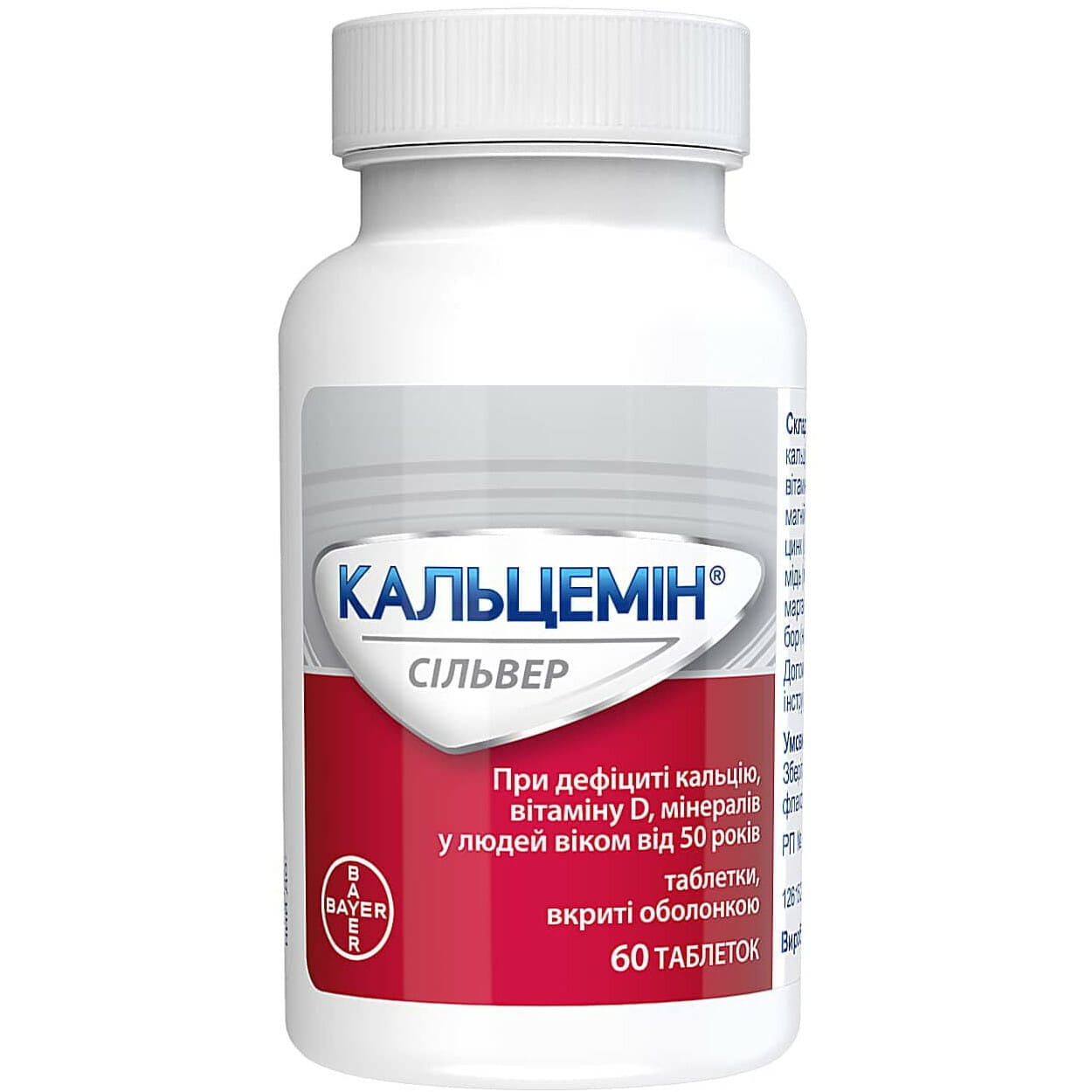
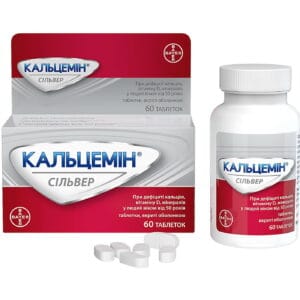
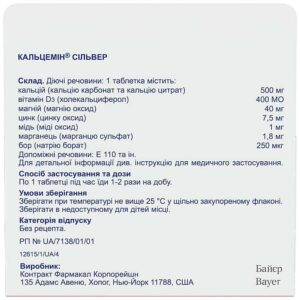
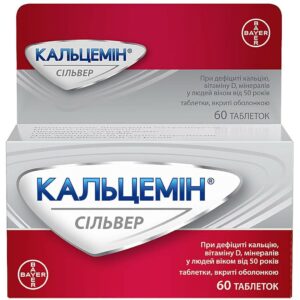
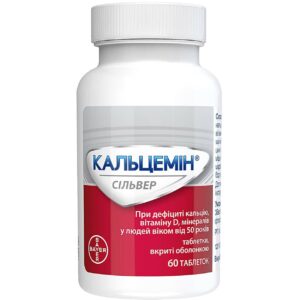
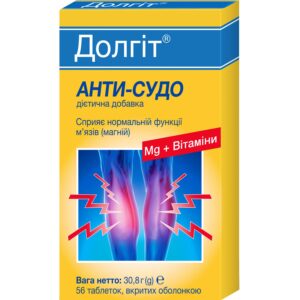
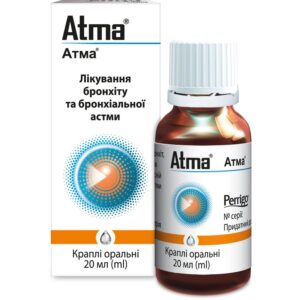

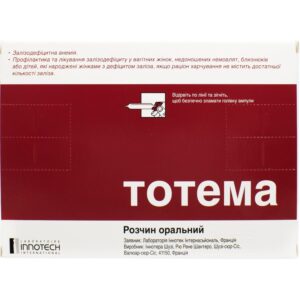
Reviews
There are no reviews yet.